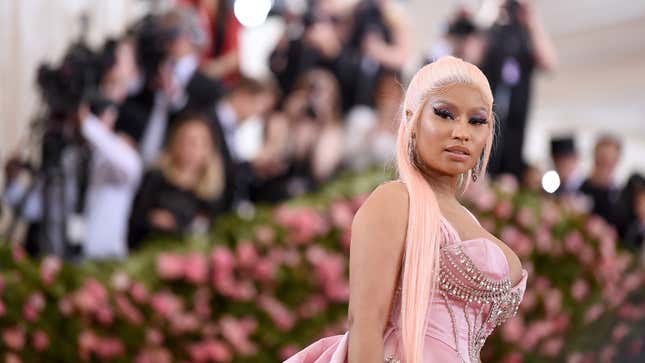Nicki Minaj vs. the Media
Last week’s attempted doxing was just the latest battle in a years-long war
EntertainmentMusic

Nicki Minaj’s attempt at doxing journalists on her Instagram stories last week for the ostensible purpose of inviting fans to pile on did not mark a new low for the star; it was like deja vu. For years, Minaj has waged war with journalists whose reporting she’s taken issue with, whose opinions she’s felt wronged by, whose questions she thought were stupid. In a certain light, one could interpret the outspoken rapper/singer as a crusader for the truth. In another less charitable interpretation, Nicki Minaj has taken a dictator’s approach to controlling the narrative.
As a result, journalists and hosts like Barbara Walters, Don Lemon, Vanessa Grigoriadis, Billy Bush, Wendy Williams, Joy Reid, Meghan McCain, outlets like BET and Spotify, plus a slew of reporters whose names aren’t quite boldfaced have found themselves in Minaj’s crosshairs.
While it had been brewing for years, Minaj’s media-hostility reached a fever pitch around the time of the release from her fourth studio album, 2018’s Queen. Minaj threatened to sue DailyMailTV host Jesse Palmer for stating that Minaj has a history of defending sex offenders. She pulled out of BET events after a tweet from the station unfavorably compared Minaj’s career to that of her sometimes rival and then-recent Grammy winner Cardi B, and then she followed up by tweeting screenshots of negative comments apparently left by her legion of Barbz on BET’s Instagram.
But maybe the defining act of Minaj’s Queen-related chaos occurred when she ordered her fans to expose and attack a Billboard writer who reported on her canceled NICKIHNDRXX tour with Future. “Barbz get me the name of this writer then hit them & tell them this is one black woman they will not bully into a corner by FRAUDULENT SHAMING TACTICS,” she wrote in the caption of an Instagram post that included a screenshot of Billboard’s tweet of the piece.
“So to clarify; because I realize common sense is far from common… I haven’t CANCELLED anything. I reversed the order of the US & EUROPEAN LEGS of my tour. This is for obvious reasons to anyone with a brain,” she continued. Eventually, she performed the European leg of that tour with Juice Wrld. She has yet to reschedule the U.S. dates. Is it now safe to call them canceled? Will it ever be?
-

-

-

-

-

-

-

-

-

-

-

-

-

-

-

-

-

-

-

-

-

-

-

-

-

-

-

-

-

-

-

-

-

-

-

-

-

-

-

-








































